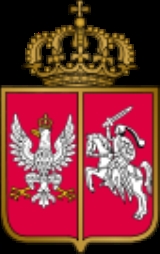
November Uprising
Encyclopedia
The November Uprising (1830–31), Polish–Russian War 1830–31 also known as the Cadet Revolution, was an armed rebellion in the heartland of partitioned
Poland
against the Russian Empire
. The uprising began on 29 November 1830 in Warsaw
when the young Polish officers
from the local Army of the Congress Poland's military academy
revolted, led by lieutenant Piotr Wysocki
. They were soon joined by large segments of Polish society, and the insurrection spread to the territories of Lithuania
, Western Belarus
, and the right-bank of Ukraine
. Despite some local successes, the uprising was eventually crushed by a numerically superior Imperial Russian Army
under Ivan Paskevich
.
 After the Partitions of Poland
After the Partitions of Poland
, Poland ceased to exist as an independent political entity at the end of 1795. However, the Napoleonic Wars
and Polish participation in the wars against Russia
and Austria
resulted in the creation of a rump Duchy of Warsaw
in 1807. The Congress of Vienna
brought the existence of that state to an end in 1815, and essentially solidified the long-term division of Poland between Russia, Prussia and the Habsburg Empire. The Austrian Empire annexed some of its territories in the South, Prussia took control over the semi-autonomous Grand Duchy of Poznań
in the West, and Russia assumed hegemony over the semi-autonomous so-called Congress Kingdom
.
Initially, the Russian-formed Congress Kingdom enjoyed a relatively large amount of internal autonomy and was only indirectly subject to imperial control, having own constitution of the Kingdom of Poland
. United with Russia through a personal union with the Tsar as King of Poland, the province could elect its own parliament (the Sejm) and government. The kingdom had its own courts, army and treasury. Over time, however, the freedoms granted to the Kingdom were gradually taken back and the constitution was progressively ignored by the Russian authorities. Alexander I of Russia
never formally crowned himself as King of Poland. Instead, in 1815, he appointed Grand Duke Constantine Pavlovich
as de facto viceroy
, disregarding the constitution.
Soon after the Congress of Vienna
resolutions were signed, Russia ceased to respect them. In 1819 Alexander I abandoned liberty of the press in Congress Kingdom and introduced censorship. Russian secret police commanded by Nikolay Nikolayevich Novosiltsev
started infiltration and persecution of Polish clandestine organizations, and in 1821 the Tsar ordered the abolition of freemasonry
. As a result, after 1825 sessions of Polish Sejm were conducted in secret. Nicholas I of Russia
formally crowned himself as King of Poland on 24 May 1829 in Warsaw.
Despite numerous protests by various Polish politicians who actively supported the "personal union", Grand Duke Constantine had no intention of respecting the Polish constitution, one of the most progressive in Europe at that time. He abolished Polish social and patriotic organizations, the liberal
opposition of the Kaliszanie
faction, and replaced Poles with Russians in important administrative positions. Although married to a Pole (Joanna Grudzińska
), he was commonly viewed as an enemy of the Polish nation. Also, his command over the Polish Army led to serious conflicts within the officer corps. These frictions led to various conspiracies throughout the country, most notably within the army.
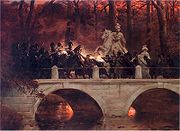
, took arms from their garrison on 29 November 1830 and attacked the Belweder Palace
, the main seat of the Grand Duke. The final spark that ignited Warsaw was a Russian plan to use the Polish Army to suppress France's July Revolution
and the Belgian Revolution
, in clear violation of the Polish constitution. The rebels managed to enter the Belweder, but Grand Duke Constantine had escaped in women's clothing. The rebels then turned to the main city arsenal, capturing it after a brief struggle. The following day, armed Polish civilians forced the Russian troops to withdraw north of Warsaw. This incident is sometimes called the Warsaw Uprising or the November Night. .
, the historian Julian Ursyn Niemcewicz
and General Józef Chłopicki took their places. Loyalists led by Prince Czartoryski initially tried to negotiate with Grand Duke Constantine and to settle matters peacefully. However, when Czartoryski told the Council that Constantine was ready to forgive the offenders and that the matter would be amicably settled, Maurycy Mochnacki
and other radicals angrily objected and demanded a national uprising. Fearing an immediate break with Russia, the Government agreed to let Constantine depart with his troops.
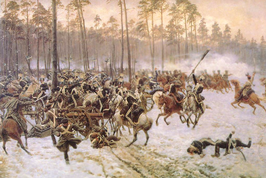 Mochnacki did not trust the newly constituted ministry and set out to replace it with the Patriotic Club, organized by him. At a large public demonstration on 3 December in Warsaw, he denounced the negotiations between the Government and Grand Duke Constantine, who was encamped outside the city. Mochnacki advocated a military campaign in Lithuania so as to spare the country the devastation of war and preserve the local food supply. The meeting adopted a number of demands to be communicated to the Administrative Council, including the establishment of a revolutionary government and an immediate attack upon the forces of Constantine. The Polish army, with all but two of its generals, Wincenty Krasiński
Mochnacki did not trust the newly constituted ministry and set out to replace it with the Patriotic Club, organized by him. At a large public demonstration on 3 December in Warsaw, he denounced the negotiations between the Government and Grand Duke Constantine, who was encamped outside the city. Mochnacki advocated a military campaign in Lithuania so as to spare the country the devastation of war and preserve the local food supply. The meeting adopted a number of demands to be communicated to the Administrative Council, including the establishment of a revolutionary government and an immediate attack upon the forces of Constantine. The Polish army, with all but two of its generals, Wincenty Krasiński
and Zygmunt Kurnatowski
, now joined the uprising.
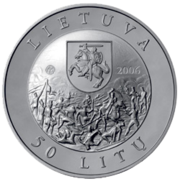 The remaining four ministers of the pre-revolutionary cabinet left the Administrative Council, and their places were taken by Mochnacki and three of his associates from the Patriotic Club, including Joachim Lelewel
The remaining four ministers of the pre-revolutionary cabinet left the Administrative Council, and their places were taken by Mochnacki and three of his associates from the Patriotic Club, including Joachim Lelewel
. The new body was known as the Provisional Government. To legalize its actions the Provisional Government ordered the convocation of the Sejm and on 5 December 1830 proclaimed Chłopicki as Dictator of the Uprising. Chłopicki considered the uprising an act of madness, but bowed to pressure and consented to take command temporarily, in the hope that it would be unnecessary to take the field. An able and highly decorated soldier, he had retired from the army because of the chicanery of Constantine. He overestimated the power of Russia and underestimated the strength and fervor of the Polish revolutionary movement. By temperament and conviction he was opposed to a war with Russia, not believing in a successful outcome. He accepted the dictatorship essentially in order to maintain internal peace and to save the Constitution.
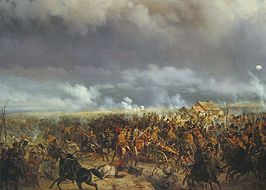 Believing that Tsar Nicholas was unaware of his brother's actions and that the uprising could be ended if the Russian authorities accepted the Constitution, Chłopicki's first move was to send Count Franciszek Ksawery Drucki-Lubecki
Believing that Tsar Nicholas was unaware of his brother's actions and that the uprising could be ended if the Russian authorities accepted the Constitution, Chłopicki's first move was to send Count Franciszek Ksawery Drucki-Lubecki
to Saint Petersburg
to negotiate. Chłopicki refrained from strengthening the Polish army and refused to initiate armed hostilities by expelling Russian forces from Lithuania. However, the radicals in Warsaw pressed for war and the complete liberation of Poland. On 13 December, the Sejm pronounced the National Uprising against Russia, and on 7 January 1831 Count Drucki-Lubecki returned from Russia with no concessions. The Tsar demanded the complete and unconditional surrender of Poland and announced that the Poles should surrender to the grace of their Emperor. His plans foiled, Chłopicki resigned the following day.
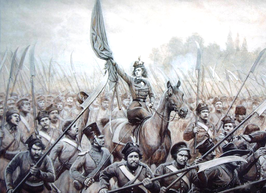 Power in Poland was now in the hands of the radicals united in the Towarzystwo Patriotyczne (Patriotic Society) led by Joachim Lelewel
Power in Poland was now in the hands of the radicals united in the Towarzystwo Patriotyczne (Patriotic Society) led by Joachim Lelewel
. On 25 January 1831, the Sejm passed the Act of Dethronization of Nicholas I
, which ended the Polish-Russian personal union and was equivalent to a declaration of war on Russia. The proclamation declared that "the Polish nation is an independent people and has a right to offer the Polish crown to him whom it may consider worthy, from whom it might with certainty expect faith to his oath and wholehearted respect to the sworn guarantees of civic freedom."
On 29 January, the National Government of Adam Jerzy Czartoryski
was established, and Michał Gedeon Radziwiłł was chosen as successor to Chłopicki. Chłopicki was persuaded to accept active command of the army.
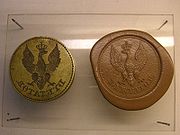
crossed the Polish borders. The first major battle took place on 14 February 1831, close to the village of Stoczek near Łuków. In the Battle of Stoczek
, Polish cavalry under Brigadier Józef Dwernicki defeated the Russian division of Teodor Geismar. However, the victory had mostly psychological value and could not stop the Russian advance towards Warsaw. The subsequent battles of Dobre, Wawer
and Białołęka were inconclusive.
The Polish forces then assembled on the right bank of the Vistula to defend the capital. On 25 February, a Polish contingent of approximately 40,000 met a Russian force of 60,000 east of Warsaw, in the Battle of Olszynka Grochowska
. Both armies withdrew after almost two days of heavy fighting and with considerable losses on both sides. Over 7,000 Poles fell on that field, and the number of killed in the Russian army was slightly larger. Diebitsch was forced to retreat to Siedlce. Warsaw was saved.
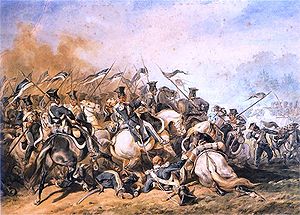 Chłopicki, whose soldierly qualities reasserted themselves by military activity, was wounded in action and his place taken by General Jan Skrzynecki who, like his predecessor, had won distinction under Napoleon for personal courage. Disliked by Grand Duke Constantine, he had retired from service. He shared with Chłopicki the conviction war with Russia was futile, but with the opening of hostilities took command of a corps and fought creditably at Grochov. When the weak and indecisive Michał Radziwiłł surrendered the dictatorship, Skrzynecki was chosen to succeed him. He endeavored to end the war by negotiations with the Russian field commanders and hoped for benign foreign intervention.
Chłopicki, whose soldierly qualities reasserted themselves by military activity, was wounded in action and his place taken by General Jan Skrzynecki who, like his predecessor, had won distinction under Napoleon for personal courage. Disliked by Grand Duke Constantine, he had retired from service. He shared with Chłopicki the conviction war with Russia was futile, but with the opening of hostilities took command of a corps and fought creditably at Grochov. When the weak and indecisive Michał Radziwiłł surrendered the dictatorship, Skrzynecki was chosen to succeed him. He endeavored to end the war by negotiations with the Russian field commanders and hoped for benign foreign intervention.
Sympathetic echoes of the Polish aspirations were reverberating throughout Europe. Under Lafayette's chairmanship, enthusiastic meetings had been held in Paris. Some money for the Polish cause was also collected in the United States. The governments of France and England, however, did not share in the feelings of their people. King Louis-Philippe of France
thought mainly of securing for himself recognition on the part of all European governments, and Lord Palmerston was intent on maintaining friendly relations with Russia. England regarded with alarm the reawakening of the French national spirit and did not wish to weaken Russia, "as Europe might soon again require her services in the cause of order, and to prevent Poland, whom it regarded as a national ally of France, from becoming a French province of the Vistula." Austria and Prussia adopted a position of benevolent neutrality towards Russia. They closed the Polish frontiers and prevented the transportation of munitions of war or supplies of any kind.
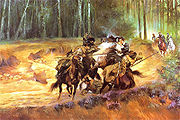 Under these circumstances the war with Russia began to take on a somber and disquieting aspect. The Poles fought desperately and attempts were made to rouse Volhynia
Under these circumstances the war with Russia began to take on a somber and disquieting aspect. The Poles fought desperately and attempts were made to rouse Volhynia
, Podolia
, Samogitia
and Lithuania
. With the exception of the Lithuanian uprising, in which the youthful Countess Emilia Plater
and several other women distinguished themselves, the guerilla warfare carried on in the frontier provinces was of minor importance and served only to give Russia an opportunity to crush local risings. Notorious was the slaughter of the inhabitants of the small town of Ashmiany in Belarus. Meanwhile, new Russian forces under Grand Duke Michael
arrived in Poland but met with many defeats. Constant warfare, however, and bloody battles such as that at Ostrołęka in which 8,000 Poles lost their lives, considerably depleted the Polish forces. Mistakes on the part of the commanders, constant changes and numerous resignations, and the indolence of the commanders, who continued to hope for foreign intervention, added to the feeling of despair.
The more radical elements severely criticized the government not only for its inactivity, but also its lack of land reform and its failure to recognize the peasants’ rights to the soil they tilled. But the Sejm, fearing that the governments of Europe might regard the war with Russia as social revolution, procrastinated and haggled over concessions. The initial enthusiasm of the peasantry waned, and the ineptitude of the government became more apparent.
In the meantime, the Russian forces, commanded after the death of Diebitsch by General Paskievitch, were moving to encircle Warsaw. Skrzynecki failed to prevent the Russian forces from joining, and the Sejm responded to popular clamor for his deposition by appointing General Dembinski to temporary command. The atmosphere was highly charged. Severe rioting took place and the government became completely disorganized. Count Jan Krukowiecki
was made President of the Ruling Council. He had little faith in the success of the military campaign, but believed that when passions had subsided he could end the war on, what seemed to him, advantageous terms.
Despite desperate defense by General Józef Sowiński
, Warsaw's suburb of Wola
fell to Paskievitch's forces on 6 September. The next day saw the second line of the capital's defensive works attacked by the Russians. During the night of the 7 September Krukowiecki capitulated, although the city still held out. He was immediately deposed by the Polish government and replaced by Bonawentura Niemojowski
. The army and the government withdrew to the Modlin fortress
, on the Vistula, subsequently renamed Novo-Georgievsk by the Russians, and then to Płock. New plans had been adopted when the news arrived that the Polish crack corps under Ramorino, unable to join the main army, had laid down its arms after crossing the Austrian frontier into Galicia. It became evident that the war could be carried on no longer.
On 5 October 1831, the remainder of the Polish army of over 20,000 men crossed the Prussian frontier and laid down their arms at Brodnica
in preference to submission to Russia. Only one man, a colonel by the name of Stryjenski, gained the peculiar distinction of giving himself up to Russia.
Following the example of Dombrowski of a generation before, General Bem endeavored to reorganize the Polish soldiers in Prussia and Galicia into Legions and lead them to France, but the Prussian government frustrated his plans. The immigrants left Prussia in bands of between fifty and a hundred, and their journey through the various German principalities was greeted with enthusiasm by the local populations. Even some of the German sovereigns, such as the King of Saxony, the Princess of Weimar
and the Duke of Gotha
shared in the general demonstration of sympathy. It was only upon the very insistent demands of Russia that the Polish committees all over Germany had to be closed.
and was least able to spare substantial forces for war with Poland. Many military critics, among them the foremost Russian writer, General Puzyrevsky, maintained that in spite of the inequality of resources of the two countries, Poland had had every chance of holding her own against Russia, had the campaign been managed skillfully. Russia sent over 180,000 well trained men against Poland's 70,000, 30% of whom were fresh recruits who entered the service at the opening of hostilities. "In view of this, one would think that not only was the result of the struggle undoubted, but its course should have been something of a triumphant march for the infinitely stronger party. Instead, the war lasted eight months, with often doubtful success. At times the balance seemed to tip decidedly to the side of the weaker adversary who dealt not only blows, but even ventured daring offensives."
It had long been argued in Poland that anarchy and lack of consensus were the causes of national downfall. Thus, when the rising finally began, people demanded absolute power for their leaders and tolerated no criticism, afraid that discord would again prove ruinous. The men chosen to lead because of their past achievements proved unable to perform the great task expected of them. Moreover, many apparently had little faith that their effort could succeed.
Militarily, Poland might have succeeded if the line of battle had been established in Lithuania
and if the Russian forces arriving in Poland had been dealt with separately and decisively.
After the end of the November Uprising, Polish women who emigrated to France wore black ribands and jewellery as a symbol of mourning for their lost homeland. Such images can be seen in the first scenes of the movie Pan Tadeusz
, filmed by Andrzej Wajda
in 1999, based on the Polish national epic.
The Scottish
poet Thomas Campbell, who had championed the cause of the Poles
in The Pleasures of Hope, was affected by the news of the capture of Warsaw
by the Russians in 1831 as if it had been the deepest of personal calamities. "Poland preys on my heart night and day", he wrote in one of his letters, and his sympathy found a practical expression in the foundation in London of the Association of the Friends of Poland.
Despite Poland's deep connection to Catholicism and the fact that many participants in the rebellion were catholic, the rebellion was condemned by the Church. Pope Gregory XVI issued an ecyclical in the following year of 1832 on the subject of civil disobedience that was entitled Cum Primum, and which stated:
Partitions of Poland
The Partitions of Poland or Partitions of the Polish–Lithuanian Commonwealth took place in the second half of the 18th century and ended the existence of the Polish–Lithuanian Commonwealth, resulting in the elimination of sovereign Poland for 123 years...
Poland
Poland
Poland , officially the Republic of Poland , is a country in Central Europe bordered by Germany to the west; the Czech Republic and Slovakia to the south; Ukraine, Belarus and Lithuania to the east; and the Baltic Sea and Kaliningrad Oblast, a Russian exclave, to the north...
against the Russian Empire
Russian Empire
The Russian Empire was a state that existed from 1721 until the Russian Revolution of 1917. It was the successor to the Tsardom of Russia and the predecessor of the Soviet Union...
. The uprising began on 29 November 1830 in Warsaw
Warsaw
Warsaw is the capital and largest city of Poland. It is located on the Vistula River, roughly from the Baltic Sea and from the Carpathian Mountains. Its population in 2010 was estimated at 1,716,855 residents with a greater metropolitan area of 2,631,902 residents, making Warsaw the 10th most...
when the young Polish officers
Non-commissioned officer
A non-commissioned officer , called a sub-officer in some countries, is a military officer who has not been given a commission...
from the local Army of the Congress Poland's military academy
Military academy
A military academy or service academy is an educational institution which prepares candidates for service in the officer corps of the army, the navy, air force or coast guard, which normally provides education in a service environment, the exact definition depending on the country concerned.Three...
revolted, led by lieutenant Piotr Wysocki
Piotr Wysocki
Piotr Wysocki , was a Polish lieutenant and leader of the Polish conspiracy against Russian Tsar Nicolas I. Nobleman of Odrowąż Coat of Arms, he raised military insurgents on 29 November 1830, starting the November Uprising against Russia...
. They were soon joined by large segments of Polish society, and the insurrection spread to the territories of Lithuania
Lithuania
Lithuania , officially the Republic of Lithuania is a country in Northern Europe, the biggest of the three Baltic states. It is situated along the southeastern shore of the Baltic Sea, whereby to the west lie Sweden and Denmark...
, Western Belarus
Belarus
Belarus , officially the Republic of Belarus, is a landlocked country in Eastern Europe, bordered clockwise by Russia to the northeast, Ukraine to the south, Poland to the west, and Lithuania and Latvia to the northwest. Its capital is Minsk; other major cities include Brest, Grodno , Gomel ,...
, and the right-bank of Ukraine
Ukraine
Ukraine is a country in Eastern Europe. It has an area of 603,628 km², making it the second largest contiguous country on the European continent, after Russia...
. Despite some local successes, the uprising was eventually crushed by a numerically superior Imperial Russian Army
Imperial Russian Army
The Imperial Russian Army was the land armed force of the Russian Empire, active from around 1721 to the Russian Revolution of 1917. In the early 1850s, the Russian army consisted of around 938,731 regular soldiers and 245,850 irregulars . Until the time of military reform of Dmitry Milyutin in...
under Ivan Paskevich
Ivan Paskevich
Ivan Fyodorovich Paskevich was a Ukrainian-born military leader. For his victories, he was made Count of Erivan in 1828 and Namestnik of the Kingdom of Poland in 1831...
.
Poland before the uprising

Partitions of Poland
The Partitions of Poland or Partitions of the Polish–Lithuanian Commonwealth took place in the second half of the 18th century and ended the existence of the Polish–Lithuanian Commonwealth, resulting in the elimination of sovereign Poland for 123 years...
, Poland ceased to exist as an independent political entity at the end of 1795. However, the Napoleonic Wars
Napoleonic Wars
The Napoleonic Wars were a series of wars declared against Napoleon's French Empire by opposing coalitions that ran from 1803 to 1815. As a continuation of the wars sparked by the French Revolution of 1789, they revolutionised European armies and played out on an unprecedented scale, mainly due to...
and Polish participation in the wars against Russia
Russian Empire
The Russian Empire was a state that existed from 1721 until the Russian Revolution of 1917. It was the successor to the Tsardom of Russia and the predecessor of the Soviet Union...
and Austria
Austrian Empire
The Austrian Empire was a modern era successor empire, which was centered on what is today's Austria and which officially lasted from 1804 to 1867. It was followed by the Empire of Austria-Hungary, whose proclamation was a diplomatic move that elevated Hungary's status within the Austrian Empire...
resulted in the creation of a rump Duchy of Warsaw
Duchy of Warsaw
The Duchy of Warsaw was a Polish state established by Napoleon I in 1807 from the Polish lands ceded by the Kingdom of Prussia under the terms of the Treaties of Tilsit. The duchy was held in personal union by one of Napoleon's allies, King Frederick Augustus I of Saxony...
in 1807. The Congress of Vienna
Congress of Vienna
The Congress of Vienna was a conference of ambassadors of European states chaired by Klemens Wenzel von Metternich, and held in Vienna from September, 1814 to June, 1815. The objective of the Congress was to settle the many issues arising from the French Revolutionary Wars, the Napoleonic Wars,...
brought the existence of that state to an end in 1815, and essentially solidified the long-term division of Poland between Russia, Prussia and the Habsburg Empire. The Austrian Empire annexed some of its territories in the South, Prussia took control over the semi-autonomous Grand Duchy of Poznań
Grand Duchy of Poznan
The Grand Duchy of Posen, or the Grand Duchy of Poznań was part of the Kingdom of Prussia, created from territories annexed by Prussia after the Partitions of Poland, and formally established following the Napoleonic Wars in 1815. Per agreements derived at the Congress of Vienna it was to have...
in the West, and Russia assumed hegemony over the semi-autonomous so-called Congress Kingdom
Congress Poland
The Kingdom of Poland , informally known as Congress Poland , created in 1815 by the Congress of Vienna, was a personal union of the Russian parcel of Poland with the Russian Empire...
.
Initially, the Russian-formed Congress Kingdom enjoyed a relatively large amount of internal autonomy and was only indirectly subject to imperial control, having own constitution of the Kingdom of Poland
Constitution of the Kingdom of Poland
The Constitution of the Kingdom of Poland was granted to the 'Congress' Kingdom of Poland by the King of Poland, Alexander I of Russia, who was obliged to issue a constitution to the newly recreated Polish state under his domain as specified by the Congress of Vienna...
. United with Russia through a personal union with the Tsar as King of Poland, the province could elect its own parliament (the Sejm) and government. The kingdom had its own courts, army and treasury. Over time, however, the freedoms granted to the Kingdom were gradually taken back and the constitution was progressively ignored by the Russian authorities. Alexander I of Russia
Alexander I of Russia
Alexander I of Russia , served as Emperor of Russia from 23 March 1801 to 1 December 1825 and the first Russian King of Poland from 1815 to 1825. He was also the first Russian Grand Duke of Finland and Lithuania....
never formally crowned himself as King of Poland. Instead, in 1815, he appointed Grand Duke Constantine Pavlovich
Grand Duke Constantine Pavlovich of Russia
Constantine Pavlovich was a grand duke of Russia and the second son of Emperor Paul I. He was the Tsesarevich of Russia throughout the reign of his elder brother Alexander I, but had secretly renounced his claim to the throne in 1823...
as de facto viceroy
Viceroy
A viceroy is a royal official who runs a country, colony, or province in the name of and as representative of the monarch. The term derives from the Latin prefix vice-, meaning "in the place of" and the French word roi, meaning king. A viceroy's province or larger territory is called a viceroyalty...
, disregarding the constitution.
Soon after the Congress of Vienna
Congress of Vienna
The Congress of Vienna was a conference of ambassadors of European states chaired by Klemens Wenzel von Metternich, and held in Vienna from September, 1814 to June, 1815. The objective of the Congress was to settle the many issues arising from the French Revolutionary Wars, the Napoleonic Wars,...
resolutions were signed, Russia ceased to respect them. In 1819 Alexander I abandoned liberty of the press in Congress Kingdom and introduced censorship. Russian secret police commanded by Nikolay Nikolayevich Novosiltsev
Nikolay Nikolayevich Novosiltsev
Count Nikolay Nikolayevich Novosiltsev was a Russian statesman and a close aide to Alexander I of Russia.He was a natural son of a wealthy nobleman, married to the aunt of Count Pavel Stroganov. This relationship secured for him a place in the Privy Committee that outlined the Government reform...
started infiltration and persecution of Polish clandestine organizations, and in 1821 the Tsar ordered the abolition of freemasonry
Freemasonry
Freemasonry is a fraternal organisation that arose from obscure origins in the late 16th to early 17th century. Freemasonry now exists in various forms all over the world, with a membership estimated at around six million, including approximately 150,000 under the jurisdictions of the Grand Lodge...
. As a result, after 1825 sessions of Polish Sejm were conducted in secret. Nicholas I of Russia
Nicholas I of Russia
Nicholas I , was the Emperor of Russia from 1825 until 1855, known as one of the most reactionary of the Russian monarchs. On the eve of his death, the Russian Empire reached its historical zenith spanning over 20 million square kilometers...
formally crowned himself as King of Poland on 24 May 1829 in Warsaw.
Despite numerous protests by various Polish politicians who actively supported the "personal union", Grand Duke Constantine had no intention of respecting the Polish constitution, one of the most progressive in Europe at that time. He abolished Polish social and patriotic organizations, the liberal
Liberalism
Liberalism is the belief in the importance of liberty and equal rights. Liberals espouse a wide array of views depending on their understanding of these principles, but generally, liberals support ideas such as constitutionalism, liberal democracy, free and fair elections, human rights,...
opposition of the Kaliszanie
Kaliszanie
Kaliszanie or Kalisz Opposition was a semi-formal political group opposed to the conservative authorities of the Kingdom of Poland in the period preceding the outbreak of the November Uprising. The circle was formed around 1820 by brothers Bonawentura and Wincenty Niemojowski, two liberal...
faction, and replaced Poles with Russians in important administrative positions. Although married to a Pole (Joanna Grudzińska
Joanna Grudzinska
Joanna Grudzińska was a Polish noble, a Princess of Łowicz and the second wife of Grand Duke Constantine Pavlovich of Russia, the de facto viceroy of the Kingdom of Poland...
), he was commonly viewed as an enemy of the Polish nation. Also, his command over the Polish Army led to serious conflicts within the officer corps. These frictions led to various conspiracies throughout the country, most notably within the army.

Outbreak
The armed struggle began when a group of conspirators led by a young cadet from the Warsaw officers' school, Piotr WysockiPiotr Wysocki
Piotr Wysocki , was a Polish lieutenant and leader of the Polish conspiracy against Russian Tsar Nicolas I. Nobleman of Odrowąż Coat of Arms, he raised military insurgents on 29 November 1830, starting the November Uprising against Russia...
, took arms from their garrison on 29 November 1830 and attacked the Belweder Palace
Belweder
Belweder is a palace in Warsaw, a few kilometers south of the Royal Castle. The President of the Republic of Poland, Bronisław Komorowski, resides at Belweder.-History:...
, the main seat of the Grand Duke. The final spark that ignited Warsaw was a Russian plan to use the Polish Army to suppress France's July Revolution
July Revolution
The French Revolution of 1830, also known as the July Revolution or in French, saw the overthrow of King Charles X of France, the French Bourbon monarch, and the ascent of his cousin Louis-Philippe, Duke of Orléans, who himself, after 18 precarious years on the throne, would in turn be overthrown...
and the Belgian Revolution
Belgian Revolution
The Belgian Revolution was the conflict which led to the secession of the Southern provinces from the United Kingdom of the Netherlands and established an independent Kingdom of Belgium....
, in clear violation of the Polish constitution. The rebels managed to enter the Belweder, but Grand Duke Constantine had escaped in women's clothing. The rebels then turned to the main city arsenal, capturing it after a brief struggle. The following day, armed Polish civilians forced the Russian troops to withdraw north of Warsaw. This incident is sometimes called the Warsaw Uprising or the November Night. .
The uprising
Taken by surprise by the rapid unfolding of events during the night of 29 November, the local Polish government (Administrative Council) assembled immediately to take control and to decide on a course of action. Unpopular ministers were removed and men like Prince Adam Jerzy CzartoryskiAdam Jerzy Czartoryski
Prince Adam Jerzy Czartoryski was a Polish-Lithuanian noble, statesman and author. He was the son of Prince Adam Kazimierz Czartoryski and Izabela Fleming....
, the historian Julian Ursyn Niemcewicz
Julian Ursyn Niemcewicz
Julian Ursyn Niemcewicz was a Polish poet, playwright and statesman. He was a leading advocate for the Constitution of May 3, 1791.-Life:...
and General Józef Chłopicki took their places. Loyalists led by Prince Czartoryski initially tried to negotiate with Grand Duke Constantine and to settle matters peacefully. However, when Czartoryski told the Council that Constantine was ready to forgive the offenders and that the matter would be amicably settled, Maurycy Mochnacki
Maurycy Mochnacki
Maurycy Mochnacki was a Polish publicist and independence activist. He participated in the November Uprising as a soldier and chronicler - Powstanie narodu polskiego w roku 1830 i 1831. After the defeat, he emigrated. In his early life, he was a supporter of Polish Jacobins ideology. He died in...
and other radicals angrily objected and demanded a national uprising. Fearing an immediate break with Russia, the Government agreed to let Constantine depart with his troops.

Wincenty Krasinski
Count Wincenty Krasiński was a Polish nobleman , political activist and military leader.He was the father of Zygmunt Krasiński, one of Poland's Three Bards—Poland's greatest romantic poets.-Life:...
and Zygmunt Kurnatowski
Zygmunt Kurnatowski
Zygmunt Aleksander Kurnatowski . He was a count and Polish noble of the Łodzia coat of arms. He was a Major General in the army of Kingdom of Poland....
, now joined the uprising.

Joachim Lelewel
Joachim Lelewel was a Polish historian and politician, from a Polonized branch of a Prussian family.His grandparents were Heinrich Löllhöffel von Löwensprung and Constance Jauch , who later polonized her name to Lelewel.-Life:Born in Warsaw, Lelewel was educated at the Imperial University of...
. The new body was known as the Provisional Government. To legalize its actions the Provisional Government ordered the convocation of the Sejm and on 5 December 1830 proclaimed Chłopicki as Dictator of the Uprising. Chłopicki considered the uprising an act of madness, but bowed to pressure and consented to take command temporarily, in the hope that it would be unnecessary to take the field. An able and highly decorated soldier, he had retired from the army because of the chicanery of Constantine. He overestimated the power of Russia and underestimated the strength and fervor of the Polish revolutionary movement. By temperament and conviction he was opposed to a war with Russia, not believing in a successful outcome. He accepted the dictatorship essentially in order to maintain internal peace and to save the Constitution.

Franciszek Ksawery Drucki-Lubecki
Franciszek Ksawery Drucki-Lubecki was an important politician of the first half of the 19th century in the partitioned Poland. He was a prince and minister of the treasury in the Congress Kingdom of Poland. He is known as one of the prominent economists and financiers of his era...
to Saint Petersburg
Saint Petersburg
Saint Petersburg is a city and a federal subject of Russia located on the Neva River at the head of the Gulf of Finland on the Baltic Sea...
to negotiate. Chłopicki refrained from strengthening the Polish army and refused to initiate armed hostilities by expelling Russian forces from Lithuania. However, the radicals in Warsaw pressed for war and the complete liberation of Poland. On 13 December, the Sejm pronounced the National Uprising against Russia, and on 7 January 1831 Count Drucki-Lubecki returned from Russia with no concessions. The Tsar demanded the complete and unconditional surrender of Poland and announced that the Poles should surrender to the grace of their Emperor. His plans foiled, Chłopicki resigned the following day.

Joachim Lelewel
Joachim Lelewel was a Polish historian and politician, from a Polonized branch of a Prussian family.His grandparents were Heinrich Löllhöffel von Löwensprung and Constance Jauch , who later polonized her name to Lelewel.-Life:Born in Warsaw, Lelewel was educated at the Imperial University of...
. On 25 January 1831, the Sejm passed the Act of Dethronization of Nicholas I
Nicholas I of Russia
Nicholas I , was the Emperor of Russia from 1825 until 1855, known as one of the most reactionary of the Russian monarchs. On the eve of his death, the Russian Empire reached its historical zenith spanning over 20 million square kilometers...
, which ended the Polish-Russian personal union and was equivalent to a declaration of war on Russia. The proclamation declared that "the Polish nation is an independent people and has a right to offer the Polish crown to him whom it may consider worthy, from whom it might with certainty expect faith to his oath and wholehearted respect to the sworn guarantees of civic freedom."
On 29 January, the National Government of Adam Jerzy Czartoryski
Adam Jerzy Czartoryski
Prince Adam Jerzy Czartoryski was a Polish-Lithuanian noble, statesman and author. He was the son of Prince Adam Kazimierz Czartoryski and Izabela Fleming....
was established, and Michał Gedeon Radziwiłł was chosen as successor to Chłopicki. Chłopicki was persuaded to accept active command of the army.

The Russo-Polish war
It was too late to move the theatre of hostilities to Lithuania. Within days, a 115,000 strong Russian army under Field Marshal Hans Karl von DiebitschHans Karl von Diebitsch
Count Hans Karl Friedrich Anton von Diebitsch und Narden was a German-born soldier serving as Russian Field Marshal....
crossed the Polish borders. The first major battle took place on 14 February 1831, close to the village of Stoczek near Łuków. In the Battle of Stoczek
Battle of Stoczek
Battle of Stoczek was the first major battle of the November Uprising in Poland. It took place on February 14, 1831, near the town of Stoczek Łukowski, on the Brest-Warsaw road....
, Polish cavalry under Brigadier Józef Dwernicki defeated the Russian division of Teodor Geismar. However, the victory had mostly psychological value and could not stop the Russian advance towards Warsaw. The subsequent battles of Dobre, Wawer
First Battle of Wawer
The First Battle of Wawer was fought on February 19 and 20, 1831, between Poland and Russia. Polish forces, led by Jan Skrzynecki, defeated Russian 1st Corps, commanded by Hans Karl von Diebitsch. After the battle, Polish commanders did not receive any reinforcements, so the victory was not decisive....
and Białołęka were inconclusive.
The Polish forces then assembled on the right bank of the Vistula to defend the capital. On 25 February, a Polish contingent of approximately 40,000 met a Russian force of 60,000 east of Warsaw, in the Battle of Olszynka Grochowska
Battle of Olszynka Grochowska
Battle of Olszynka Grochowska was the largest battle of the November Uprising and biggest friction in Europe since the battle of Waterloo. It was fought between the armies of Poland and Russia on February 25 in the woods near Grochów, at the eastern outskirts of Warsaw.- Before the battle :The...
. Both armies withdrew after almost two days of heavy fighting and with considerable losses on both sides. Over 7,000 Poles fell on that field, and the number of killed in the Russian army was slightly larger. Diebitsch was forced to retreat to Siedlce. Warsaw was saved.

Sympathetic echoes of the Polish aspirations were reverberating throughout Europe. Under Lafayette's chairmanship, enthusiastic meetings had been held in Paris. Some money for the Polish cause was also collected in the United States. The governments of France and England, however, did not share in the feelings of their people. King Louis-Philippe of France
Louis-Philippe of France
Louis Philippe I was King of the French from 1830 to 1848 in what was known as the July Monarchy. His father was a duke who supported the French Revolution but was nevertheless guillotined. Louis Philippe fled France as a young man and spent 21 years in exile, including considerable time in the...
thought mainly of securing for himself recognition on the part of all European governments, and Lord Palmerston was intent on maintaining friendly relations with Russia. England regarded with alarm the reawakening of the French national spirit and did not wish to weaken Russia, "as Europe might soon again require her services in the cause of order, and to prevent Poland, whom it regarded as a national ally of France, from becoming a French province of the Vistula." Austria and Prussia adopted a position of benevolent neutrality towards Russia. They closed the Polish frontiers and prevented the transportation of munitions of war or supplies of any kind.

Volhynia
Volhynia, Volynia, or Volyn is a historic region in western Ukraine located between the rivers Prypiat and Southern Bug River, to the north of Galicia and Podolia; the region is named for the former city of Volyn or Velyn, said to have been located on the Southern Bug River, whose name may come...
, Podolia
Podolia
The region of Podolia is an historical region in the west-central and south-west portions of present-day Ukraine, corresponding to Khmelnytskyi Oblast and Vinnytsia Oblast. Northern Transnistria, in Moldova, is also a part of Podolia...
, Samogitia
Samogitia
Samogitia is one of the five ethnographic regions of Lithuania. It is located in northwestern Lithuania. Its largest city is Šiauliai/Šiaulē. The region has a long and distinct cultural history, reflected in the existence of the Samogitian dialect...
and Lithuania
Lithuania
Lithuania , officially the Republic of Lithuania is a country in Northern Europe, the biggest of the three Baltic states. It is situated along the southeastern shore of the Baltic Sea, whereby to the west lie Sweden and Denmark...
. With the exception of the Lithuanian uprising, in which the youthful Countess Emilia Plater
Emilia Plater
Countess Emilia Plater was a Polish-Lithuanian noblewoman and revolutionary from the lands of the partitioned Polish-Lithuanian Commonwealth...
and several other women distinguished themselves, the guerilla warfare carried on in the frontier provinces was of minor importance and served only to give Russia an opportunity to crush local risings. Notorious was the slaughter of the inhabitants of the small town of Ashmiany in Belarus. Meanwhile, new Russian forces under Grand Duke Michael
Grand Duke Michael Pavlovich of Russia
Grand Duke Michael Pavlovich of Russia was the tenth child and fourth son of Paul I of Russia and Sophie Dorothea of Württemberg.-Marriage and issue:In St...
arrived in Poland but met with many defeats. Constant warfare, however, and bloody battles such as that at Ostrołęka in which 8,000 Poles lost their lives, considerably depleted the Polish forces. Mistakes on the part of the commanders, constant changes and numerous resignations, and the indolence of the commanders, who continued to hope for foreign intervention, added to the feeling of despair.
The more radical elements severely criticized the government not only for its inactivity, but also its lack of land reform and its failure to recognize the peasants’ rights to the soil they tilled. But the Sejm, fearing that the governments of Europe might regard the war with Russia as social revolution, procrastinated and haggled over concessions. The initial enthusiasm of the peasantry waned, and the ineptitude of the government became more apparent.
In the meantime, the Russian forces, commanded after the death of Diebitsch by General Paskievitch, were moving to encircle Warsaw. Skrzynecki failed to prevent the Russian forces from joining, and the Sejm responded to popular clamor for his deposition by appointing General Dembinski to temporary command. The atmosphere was highly charged. Severe rioting took place and the government became completely disorganized. Count Jan Krukowiecki
Jan Krukowiecki
Count Jan Stefan Krukowiecki was a Polish general and chairman of the Polish National Government during the November Uprising and general during Napoleonic Wars fighting in the troops of Napoleon.-Early life and education:...
was made President of the Ruling Council. He had little faith in the success of the military campaign, but believed that when passions had subsided he could end the war on, what seemed to him, advantageous terms.
Despite desperate defense by General Józef Sowiński
Józef Sowinski
Józef Sowiński was a Polish artillery general and one of the heroes of Poland's November 1830 Uprising.-Biography:Józef Longin Sowiński was born March 15, 1777 Warsaw, after graduating from the famous Corps of Cadets in Warsaw, he joined the Polish Army as a lieutenant during the Kościuszko Uprising...
, Warsaw's suburb of Wola
Wola
Wola is a district in western Warsaw, Poland, formerly the village of Wielka Wola, incorporated into Warsaw in 1916. An industrial area with traditions reaching back to the early 19th century, it is slowly changing into an office and residential district...
fell to Paskievitch's forces on 6 September. The next day saw the second line of the capital's defensive works attacked by the Russians. During the night of the 7 September Krukowiecki capitulated, although the city still held out. He was immediately deposed by the Polish government and replaced by Bonawentura Niemojowski
Bonawentura Niemojowski
Bonawentura Niemojowski was a Polish lawyer, writer and politician. He was one of the leaders of Polish National Government during the November Uprising.-Biography:...
. The army and the government withdrew to the Modlin fortress
Modlin Fortress
Modlin Fortress is one of the biggest 19th century fortresses in Poland. It is located the town of Nowy Dwór Mazowiecki in district Modlin on the Narew river, some 50 kilometres north of Warsaw...
, on the Vistula, subsequently renamed Novo-Georgievsk by the Russians, and then to Płock. New plans had been adopted when the news arrived that the Polish crack corps under Ramorino, unable to join the main army, had laid down its arms after crossing the Austrian frontier into Galicia. It became evident that the war could be carried on no longer.
On 5 October 1831, the remainder of the Polish army of over 20,000 men crossed the Prussian frontier and laid down their arms at Brodnica
Brodnica
Brodnica is a town in northern Poland with 27,400 inhabitants . Previously part of Toruń Voivodeship [a province], from 1975 to 1998, Brodnica has been situated in the Kuyavian-Pomeranian Voivodeship since 1999...
in preference to submission to Russia. Only one man, a colonel by the name of Stryjenski, gained the peculiar distinction of giving himself up to Russia.
Following the example of Dombrowski of a generation before, General Bem endeavored to reorganize the Polish soldiers in Prussia and Galicia into Legions and lead them to France, but the Prussian government frustrated his plans. The immigrants left Prussia in bands of between fifty and a hundred, and their journey through the various German principalities was greeted with enthusiasm by the local populations. Even some of the German sovereigns, such as the King of Saxony, the Princess of Weimar
Weimar
Weimar is a city in Germany famous for its cultural heritage. It is located in the federal state of Thuringia , north of the Thüringer Wald, east of Erfurt, and southwest of Halle and Leipzig. Its current population is approximately 65,000. The oldest record of the city dates from the year 899...
and the Duke of Gotha
Ernst I, Duke of Saxe-Coburg and Gotha
Ernest I, Duke of Saxe-Coburg and Gotha, formerly Ernest III, Duke of Saxe-Coburg-Saalfeld was the duke of Saxe-Coburg-Saalfeld and from 1826, the first sovereign duke of Saxe-Coburg and Gotha....
shared in the general demonstration of sympathy. It was only upon the very insistent demands of Russia that the Polish committees all over Germany had to be closed.
Postscript
Adam Czartoryski remarked that the war with Russia, precipitated by the rising of young patriots in November 1830, came either too early or too late. Some writers argue that the rising should have been initiated in 1828 when Russia was experiencing reverses in TurkeyTurkey
Turkey , known officially as the Republic of Turkey , is a Eurasian country located in Western Asia and in East Thrace in Southeastern Europe...
and was least able to spare substantial forces for war with Poland. Many military critics, among them the foremost Russian writer, General Puzyrevsky, maintained that in spite of the inequality of resources of the two countries, Poland had had every chance of holding her own against Russia, had the campaign been managed skillfully. Russia sent over 180,000 well trained men against Poland's 70,000, 30% of whom were fresh recruits who entered the service at the opening of hostilities. "In view of this, one would think that not only was the result of the struggle undoubted, but its course should have been something of a triumphant march for the infinitely stronger party. Instead, the war lasted eight months, with often doubtful success. At times the balance seemed to tip decidedly to the side of the weaker adversary who dealt not only blows, but even ventured daring offensives."
It had long been argued in Poland that anarchy and lack of consensus were the causes of national downfall. Thus, when the rising finally began, people demanded absolute power for their leaders and tolerated no criticism, afraid that discord would again prove ruinous. The men chosen to lead because of their past achievements proved unable to perform the great task expected of them. Moreover, many apparently had little faith that their effort could succeed.
Militarily, Poland might have succeeded if the line of battle had been established in Lithuania
Lithuania
Lithuania , officially the Republic of Lithuania is a country in Northern Europe, the biggest of the three Baltic states. It is situated along the southeastern shore of the Baltic Sea, whereby to the west lie Sweden and Denmark...
and if the Russian forces arriving in Poland had been dealt with separately and decisively.
After the end of the November Uprising, Polish women who emigrated to France wore black ribands and jewellery as a symbol of mourning for their lost homeland. Such images can be seen in the first scenes of the movie Pan Tadeusz
Pan Tadeusz (film)
Pan Tadeusz: The Last Foray in Lithuania is a 1999 Polish film directed by Andrzej Wajda. It is based on the eponymous epic poem by Polish poet, writer and philosopher Adam Mickiewicz . In his film, Andrzej Wajda weaves the tangled passions of men and women into a handsome, expansive tapestry of...
, filmed by Andrzej Wajda
Andrzej Wajda
Andrzej Wajda is a Polish film director. Recipient of an honorary Oscar, he is possibly the most prominent member of the unofficial "Polish Film School"...
in 1999, based on the Polish national epic.
The Scottish
Scotland
Scotland is a country that is part of the United Kingdom. Occupying the northern third of the island of Great Britain, it shares a border with England to the south and is bounded by the North Sea to the east, the Atlantic Ocean to the north and west, and the North Channel and Irish Sea to the...
poet Thomas Campbell, who had championed the cause of the Poles
Poles
thumb|right|180px|The state flag of [[Poland]] as used by Polish government and diplomatic authoritiesThe Polish people, or Poles , are a nation indigenous to Poland. They are united by the Polish language, which belongs to the historical Lechitic subgroup of West Slavic languages of Central Europe...
in The Pleasures of Hope, was affected by the news of the capture of Warsaw
Warsaw
Warsaw is the capital and largest city of Poland. It is located on the Vistula River, roughly from the Baltic Sea and from the Carpathian Mountains. Its population in 2010 was estimated at 1,716,855 residents with a greater metropolitan area of 2,631,902 residents, making Warsaw the 10th most...
by the Russians in 1831 as if it had been the deepest of personal calamities. "Poland preys on my heart night and day", he wrote in one of his letters, and his sympathy found a practical expression in the foundation in London of the Association of the Friends of Poland.
Despite Poland's deep connection to Catholicism and the fact that many participants in the rebellion were catholic, the rebellion was condemned by the Church. Pope Gregory XVI issued an ecyclical in the following year of 1832 on the subject of civil disobedience that was entitled Cum Primum, and which stated:
When the first report of the calamities, which so seriously devastated your flourishing kingdom reached our ears, We learned simultaneously that they had been caused by some fabricators of deceit and lies. Under the pretext of religion, and revolting against the legitimate authority of the princes, they filled their fatherland, which they loosed from due obedience to authority, with mourning. We shed abundant tears at the feet of God, grieving over the harsh evil with which some of our flock was afflicted. Afterward We humbly prayed that God would enable your provinces, agitated by so many and so serious dissensions, to be restored to peace and to the rule of legitimate authority.
See also
- Great EmigrationGreat EmigrationThe Great Emigration was an emigration of political elites from Poland from 1831–1870. Since the end of the 18th century, a major role in Polish political life was played by people who carried out their activities outside the country as émigrés...
- List of Polish uprisings
- Warszawianka 1831 rokuWarszawianka 1831 rokuWarszawianka 1831 roku, La Varsovienne written by Casimir François Delavigne, music by Karol Kurpiński.The song was written in support of the November Uprising of 1830-1831...
- Revolutionary etude
- Hôtel LambertHôtel LambertHôtel Lambert is a hôtel particulier, a grand mansion townhouse, on the Quai Anjou on the eastern tip of the Île Saint-Louis, Paris IVème; the name, Hôtel Lambert, was a sobriquet that designated a 19th-century political faction of Polish exiles, who gathered there.-Architectural history:The house...
- Polish National Government (November Uprising)Polish National Government (November Uprising)Polish National Government of 1831 was a Polish supreme authority during November Uprising against Russian occupation of Poland. It was created by the decree of the Sejm of the Congress Poland on 29 January 1831 to assume the competences of the Polish head of state in the aftermath of another...
- Sources in Polish

